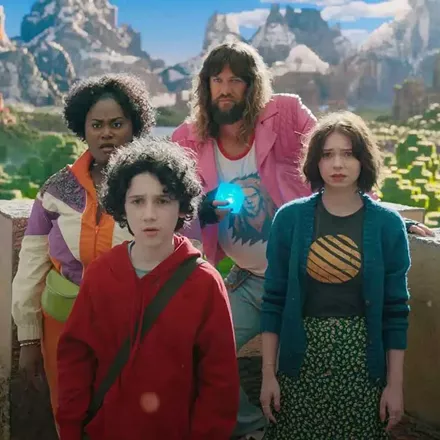Making a funny/sad movie is a lot harder. You have to find some way to make the slow death amusing without putting so much poop in the scene that your characters lose dignity.
Director Alexander Payne, whose Election and Citizen Ruth were two of the smartest comedies of recent years, pretty much succeeds in the funny/sad category with About Schmidt, a character study of a man with no character.
Jack Nicholson plays the titular Schmidt, a 67-year-old non-person living in the non-city of Omaha with his wife and comb-over. At his retirement party Schmidt begins to realize that he has given up every element of himself in order to maintain a home, a family and a complete lack of self-awareness.
Without a job to distract him from the void, Schmidt spends most of his time with his best friend, television. Unable to connect with those around him, he tries to find some meaning by "adopting" a poor African child through a $22-a-month contribution to a children's charity. In this way he acquires his confessor, 6-year-old Ndugu, to whom he writes letters detailing the progress of his post-retirement life.
Thus we see Schmidt driving about the bleak Omaha landscape with his voice-over announcing "Dear Ndugu ... my wife forces me to sit down when I pee." There's just something sad and terrible about a 67-year-old man complaining to a 6-year-old Nigerian orphan. Funny, but sad and terrible.
Funny, sad and terrible are all trademarks of director Alexander Payne, but this film is markedly different from his last two. In Citizen Ruth and especially in Election, Payne didn't just find his characters a bit pathetic, he actually seemed to be ridiculing them and everything they thought and felt. Now, this worked in those films because they were more broadly comic, but to make About Schmidt effective Payne couldn't make his characters quite so distant. It's not that he doesn't ridicule the vapid speech and unsophisticated hair of his Nebraska neighbors (Payne grew up there), it's just that now he's doing it with a sense of warmth.
In this way the audience doesn't just feels sorry for Schmidt, rather they feel sympathy with him. In order to pull this off, Payne needed Nicholson to reign in the excesses that have made him something of a self-parody in recent years, and Nicholson largely complies. I don't think Nicholson is even capable of a great performance anymore, but this one is passably mediocre enough that he'll almost surely get an Academy Award for it.
In fact, he does a reasonably good job when he has to show the effects of emotion on a man with no access to himself. Schmidt's life pretty much begins when he comes home to find that his wife has died. As the coroner wheels her body out of the house, Nicholson expresses precisely the emotion of a man who has spent the better part of his life avoiding getting to know anyone: He seems confused.
Alone in the world for the first time in his life, Schmidt decides to annoy his daughter (Hope Davis), who is on the verge of marrying Randall Hertzel, the world's biggest schmoe. Dermot Mulroney, sporting a mullet that would embarrass the leader of the Trent Lott fan club, plays Hertzel, a waterbed salesman who has dreams of becoming an Amway distributor.
The thought of his daughter marrying a man who wears plaid sport jackets is too much for Schmidt, so he hops in his RV and heads off to stop the wedding. Waylaid along the way, he tours the barren wastelands in the heart of the U.S., looking into all the faux-historical sites and Disneyfied tourist attractions in an attempt to find the simulated roadside attraction that is himself.
Throughout, cinematographer James Glennon captures an almost other-worldly ugliness. Everything he shoots, whether it's a tree, a sky, a face or a phone booth, looks like it's been through the wash a few too many times. Glennon has worked with Payne on all of his films, and together they've created one of the most unappetizing aesthetics around. No one in any Payne film could be said to look pretty, which, in a sea of Hollywood films about people with perfect complexions and their matching automobiles, is a refreshing change of pace.
The actors seem to rise to the challenge of being unappealing. Kathy Bates, as Hertzel's mother, courageously does a nude scene while trying to seduce the hapless Schmidt with tales of her orgasmic prowess. Howard Hesseman pulls out his '60s-survivor act with decent effect, and Hope Davis is awesome and understated as Schmidt's tired, defeated daughter. If they gave Academy Awards for performances so subtle they vanish into the feelings they're trying to convey, Davis would win one. Of course, that's not what they give Academy Awards for, so Davis will just have to settle for being completely ignored. Frankly, that's probably preferable to receiving an award that has also been given to Kevin Costner and Oliver Stone.
Payne, of course, will never get one of those statues, but that's because his work is a little too mean and honest. Further, Schmidt is not a perfect film; in fact, Election is better realized, but then Schmidt tries to do something much more difficult, which is to show what's inside someone who never bothered to look there himself. To the extent that it succeeds, it's more than worth seeing.














